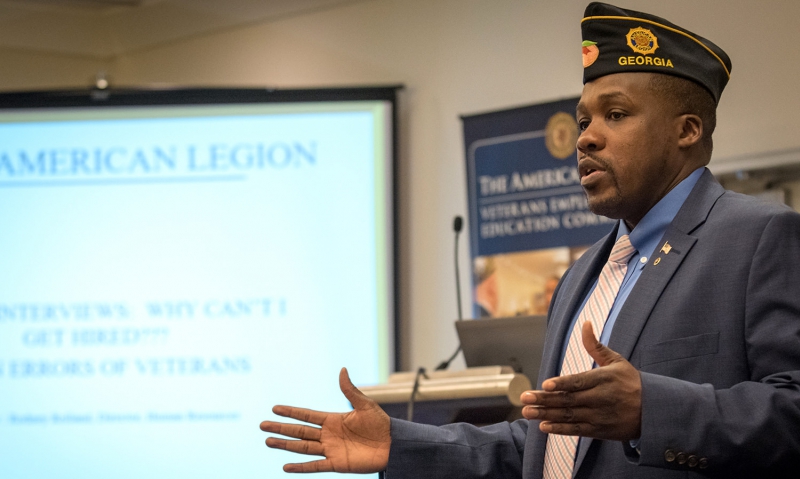
Importance of a strong résumé stressed during American Legion employment workshop.
When Verna Jones left the U.S. Army, she did so with both a college education and what she felt was a strong résumé. But that didn’t mean immediately landing a new career.
“I thought ‘I am ready,’” Jones said. “I sent my résumé out, and I waited. And I waited, and I waited some more. I kept trying to figure out why people weren’t calling.”
Jones, who became the Legion’s first female executive director when she took over the organization’s D.C. office in 2014, said she went to a military transition assistance office, where she was told her résumé was “horrible” and didn’t translate well into the civilian workforce.
“Once I tweaked my résumé, the offers to come in and interview kept coming in,” Jones said. “It’s important that we present ourselves in the right manner. We only get a couple minutes for people to decide if they’re going to continue to read or they’re going to put (the résumé) to the side."
Jones shared her experience during a résumé-writing workshop provided by The American Legion as part of its Washington Conference Employment Forum. The workshop was led by Rodney Rolland, a Marine Corps veteran and the Legion’s human resources director.
Rolland said a résumé serves a very distinct purpose.
“Veterans have a bad habit of believing that the (purpose of the) résumé is to get a job,” Rolland said. “It’s to get you an interview. You have to remember that as you go through and do your résumé because it will uniquely change the way you actually put your résumé together.
“Veterans typically have a way of trying to put everything into the résumé because they think it’s an opportunity to get hired. That’s not the case at all. Everything you put together for the résumé is simply to get you to the dance.”
Once a veteran is granted an interview is typically when they shine. “What veterans are struggling with is getting to the interview,” he said. “Once you get to the interview, you can sell yourself and all the opportunities that you can bring.”
Rolland echoed Jones’ advice about making sure a résumé wasn’t too military-centric, suggesting job-seekers remove military job titles and military skills that hiring personnel won’t understand. He called it an opportunity to brag while being careful.
“Keep your résumé very basic,” Rolland said. “Make sure your skills and qualities relate to the position. While you’re bragging about your best qualities, this is the section where veterans typically put stuff in that the civilian may not understand. You’ve got to make sure that everything you put in here, you’ve got to assume that a civilian is looking at it. So when you do put this together, get it to a civilian (to review) to see if they ask any questions.”
Rolland said a résumé should be one to two pages. He alsotold job-seekers to have three résumés: one for your ideal job, another for jobs you feel you can walk in and do immediately, and a third that serves as a catch-all résumé.
He also urged job-seekers to use résumé forms that are functional or targeted, rather than chronological.
That information proved valuable to 29-year-old Air Force veteran Veronica Brown. “One of the things that I’ve been really concerned about is the fact that I have a chronological résumé,” she said. “I don’t think necessarily serves me well. My military experience was over eight years ago at this point, and to a lot of employers that just seems invalid, and it’s not. I still use those skills day to day throughout my entire life. I have to find some way to highlight that. To be told by somebody who’s in HR – somebody who does this for a living – ‘Hey, this is actually the résumé format I prefer’ really put me more at ease, and it’s definitely something I’m going to change.”
Lt. Col. Ronna Trent, who works in the Army’s Soldier for Life office in Crystal City, Md., actually received her retirement orders the morning of the workshop. She’ll leave the Army after a 20-year career and wanted to make sure she was prepared for the next staff of employment.
“I’ve been to other résumé-writing workshops … but I need to hear about transition from multiple perspectives,” Trent said. “And The American Legion is one of the biggest players, if not the biggest player, in the veterans space. So I wanted to specifically come to something they were sponsoring.”
Attendees also received financial planning advice from New York Life employees that included how to properly fund a military retirement. Judy Viccellio, a partner with New York Life, also announced that her company is teaming up with The American Legion to provide a series of financial workshops at Legion posts located near military bases throughout the country.
“Very few of us get financial literacy,” Viccellio said. “Here’s a big secret: It’s not that hard. But we need to be educated.”
And during a lunch break, Maj. Gen. Robert Michael Smith – deputy chief of the U.S. Army Reserve – spoke of the quality of employment candidates leaving the military. “We’re growing leaders,” he said. “They really have some rich experiences most people don’t have.”
- Careers

